Kenneth L. Gentry Jr.'s Blog, page 99
May 10, 2016
CHRIST AND EUROPE
 PMT-2016-032 by David Stoddard in Tabletalk
PMT-2016-032 by David Stoddard in Tabletalk
[Below is the first part of an excellent article titled “Christ Will Build His Church” that appeared in the April, 2016 Tabletalk devotional guide. I hope you will click the link and keep reading. – Ken Gentry]
Christ Will Build His Church
Europe is the new “dark continent.” Africa now sends more missionaries to Europe than Europe sends to Africa. The health reports of the European church aren’t terribly encouraging. Churches are closing and are being converted into mosques, museums, bars, and book depositories. In most European countries, less than 5 percent of the population attend any church. In France, there are more practicing Muslims than baptized Catholics. In England, more than 70 percent have no intention of stepping into a church—ever. In Berlin, the city where we live, 95 percent of church plants fail.
The Glory of Christ (book by R. C. Sproul)
From the angels’ revelation of Jesus’ glory to the shepherds outside Bethlehem,
to Jesus’ life-changing revelation of His glory to Paul on the Damascus road, Sproul guides us to a deeper understanding of Christ’s glory.
For more study materials: www.KennethGentry.com
Recently, I was asked two questions at a missions conference in the United States. First, what does it mean that Europe is post-Christian? Second, what hope does the church have in such an environment? The second question disturbed me. What hope does the church have? The question reflects an attitude of resignation in regard to what God is doing in Europe. I sometimes see this attitude on home ministry assignment. “Why should we support missionaries to Europe?” we are asked. “It’s expensive. We can get a better bang for our buck elsewhere. Besides, they already had their chance. God isn’t working there anymore.”
The Power of the Gospel
We miss the power of the gospel when we place problems before promises. In Matthew 16:18, Jesus promises Peter, “On this rock I will build my church, and the gates of hell shall not prevail against it.” Christ is building His church. Every other religion in the world proclaims a message of acceptance, inclusion, and hope based on human works and striving. But Christianity is radically different. Eternal acceptance into a relationship with the Creator and the expansion of His kingdom are both based on Jesus’ works. That’s why Martin Luther wrote:
Did we in our own strength confide, our striving would be losing;
were not the right Man on our side, the Man of God’s own choosing:
Dost ask who that may be? Christ Jesus, it is He;
Lord Sabaoth, His name, from age to age the same,
And He must win the battle.
Just a few verses later, Peter forgets the promise of the gospel and sees only problems. Jesus declares that the battle will be won through His death. “You can’t die. That doesn’t make sense. It doesn’t fit our plan,” a befuddled Peter thinks. He forgets the promise that victory comes through the death of Christ on the cross, not in spite of it. Christ’s death is not only the foundation of the church, it is also the means to expand it. Christ is building His church in Europe. Salvation comes through suffering and sacrifice. It was true of Jesus and will be true of His church.
Problems as Platforms
We miss the opportunities for gospel proclamation when we fail to see problems as platforms for ministry.
Greatness of the Great Commission (by Ken Gentry)
An insightful analysis of the full implications of the great commission. Impacts postmillennialism as well as the whole Christian worldview.
See more study materials at: www.KennethGentry.com
In Acts 16, Paul and Silas are unjustly thrown into a Roman jail. They are flogged, beaten, and humiliated. At midnight, Paul and Silas begin to sing. The skeptical onlookers don’t have categories for what they are witnessing. The Spirit comes and turns the Philippian jail into a spectacle of His power. Doors fly open, chains drop loose, a violent earthquake shakes the ground, and the jailer and his family come to faith. An arena of darkness and persecution becomes a platform for the proclamation of the gospel.
Europe is definitely hostile and post-Christian. But that’s not all….
To continue reading, click: http://www.ligonier.org/learn/articles/christ-will-build-his-church/
Click on the following images for more information on these studies:











May 6, 2016
REVELATION AND LITERALISM? (2)
 PMT 2016-031 by Kenneth L. Gentry, Jr.
PMT 2016-031 by Kenneth L. Gentry, Jr.
This is part two of a two-part study on the question of literalism in Revelation. Despite televangelists and rapture-predictors, Revelation is not to be interpreted literalistically. I examined three reasons why this is so in the previous article. I now would like to present one final argument against literalism:
Even if we set aside John’s own opening announcement regarding the symbolic nature of his prophecy, and his explanation of his very first vision, and his interpretive practice elsewhere in Revelation, we should avoid literalism on the basis of common sense. Consider the following absurdities that would arise on the literalist approach.
Revelation 4—7
We should expect bizarre and rather grotesque angels in heaven: “Also before the throne there was what looked like a sea of glass, clear as crystal. In the center, around the throne, were four living creatures, and they were covered with eyes, in front and in back” (Rev. 4:6). And this is despite the fact that when men actually see angels on the earth, they can be confused with humans (e.g., Gen 19:1, 5; Dan 9:21).
Though John actually sees a lamb in some of his visions, we know that he is not literally teaching us about the actions of a mammal of the genus Ovis in the family Bovidae. “Then I saw a Lamb, looking as if it had been slain, standing in the center of the throne, encircled by the four living creatures and the elders. He had seven horns and seven eyes, which are the seven spirits of God sent out into all the earth” (Rev. 5:6). I noted previously in this chapter that this “Lamb” is actually worshiped and praised as the Redeemer of God’s people.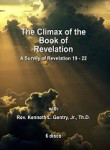
The Climax of the Book of Revelation (Rev 19-22)
Six lectures on six DVDs that introduce Revelation as a whole, then focuses on its glorious conclusion. Provides an important, lengthy Introduction to Revelation also.
See more study materials at: www.KennethGentry.com
Nor should we expect a time in the future wherein the world witnesses a global assault by four literal horsemen, each riding upon an Equus caballus:
“I watched as the Lamb opened the first of the seven seals. Then I heard one of the four living creatures say in a voice like thunder, ‘Come!’ I looked, and there before me was a white horse! Its rider held a bow, and he was given a crown, and he rode out as a conqueror bent on conquest. When the Lamb opened the second seal, I heard the second living creature say, ‘Come!’ Then another horse came out, a fiery red one. Its rider was given power to take peace from the earth and to make men slay each other. To him was given a large sword. When the Lamb opened the third seal, I heard the third living creature say, ‘Come!’ I looked, and there before me was a black horse! Its rider was holding a pair of scales in his hand. Then I heard what sounded like a voice among the four living creatures, saying, ‘A quart of wheat for a day’s wages, and three quarts of barley for a day’s wages, and do not damage the oil and the wine!’ When the Lamb opened the fourth seal, I heard the voice of the fourth living creature say, ‘Come!’ I looked, and there before me was a pale horse! Its rider was named Death, and Hades was following close behind him. They were given power over a fourth of the earth to kill by sword, famine and plague, and by the wild beasts of the earth” (Rev. 6:1-8).
Elsewhere in Revelation John speaks of men actually washing robes in blood in order to make them white: “And he said, ‘These are they who have come out of the great tribulation; they have washed their robes and made them white in the blood of the Lamb’” (Rev. 7:14).
Revelation 9—16
And what shall we say of the locusts he sees? “And the appearance of the locusts was like horses prepared for battle; and on their heads, as it were, crowns like gold, and their faces were like the faces of men” (Rev. 9:7). Or of the horses and their riders? “And this is how I saw in the vision the horses and those who sat on them: the riders had breastplates the color of fire and of hyacinth and of brimstone; and the heads of the horses are like the heads of lions; and out of their mouths proceed fire and smoke and brimstone” (Rev. 9:17).
Keys to the Book of Revelation
(DVDs by Ken Gentry)
Provides the necessary keys for opening Revelation to a deeper and clearer understanding.
See more study materials at: www.KennethGentry.com
Do we really expect a literal multi-headed dragon to pull down one-third of the trillions of stars in the Universe, throwing them upon the earth? “Then another sign appeared in heaven: an enormous red dragon with seven heads and ten horns and seven crowns on his heads. His tail swept a third of the stars out of the sky and flung them to the earth. The dragon stood in front of the woman who was about to give birth, so that he might devour her child the moment it was born” (Rev. 12:3-4).
On the literalist approach, who is the winged woman who stands on the moon? And the serpent that vomits out a river of water? “The woman was given the two wings of a great eagle, so that she might fly to the place prepared for her in the desert, where she would be taken care of for a time, times and half a time, out of the serpent’s reach. Then from his mouth the serpent spewed water like a river, to overtake the woman and sweep her away with the torrent” (Rev. 12:14-15).
Will John’s dreaded beast literally look like a compound of three representatives of the mammalian order Carnivora? “The beast I saw resembled a leopard, but had feet like those of a bear and a mouth like that of a lion” (Rev. 13:2a).
Is the second beast John sees literal? “Then I saw another beast, coming out of the earth. He had two horns like a lamb, but he spoke like a dragon” (Rev. 13:11). Is the angel of God actually going to reap the earth with a literal sickle? “Then another angel came out of the temple and called in a loud voice to him who was sitting on the cloud, ‘Take your sickle and reap, because the time to reap has come, for the harvest of the earth is ripe’” (Rev. 14:15). Do demon spirits literally appear in history in the form of frogs coming from the mouths of evil beings? “Then I saw three evil spirits that looked like frogs; they came out of the mouth of the dragon, out of the mouth of the beast and out of the mouth of the false prophet” (Rev. 16:13).
Revelation 17—21
Is the Great Harlot really a vampire who drinks blood to the point of intoxication? “I saw that the woman was drunk with the blood of the saints, the blood of those who bore testimony to Jesus” (Rev. 17:6). Will Jesus physically ride out of heaven and through the sky on horse, while clamping a sword in his teeth? “Out of his mouth comes a sharp sword with which to strike down the nations” (Rev. 19:15a).
Do we expect a literal city (complete with plumbing and electricity?) to descend to the earth from heaven? “And he carried me away in the Spirit to a mountain great and high, and showed me the Holy City, Jerusalem, coming down out of heaven from God” (Rev. 21:10). And will it be so gigantic that it will extend from the earth’s surface upwards of 1500 miles, about 1200 miles higher than the Space Shuttle orbits? “And the city is laid out as a square, and its length is as great as the width; and he measured the city with the rod, fifteen hundred miles; its length and width and height are equal” (Rev. 21:16).
Surely no one would interpret Revelation in this way. And as we have seen, Revelation confronts the literalist with one problem after another. To paraphrase Mark Twain, we might say of Revelation’s absurdities if taken literally: “Revelation is just one darned thing after another.”








May 3, 2016
REVELATION AND LITERALISM (1)
 PMT 2016-030 by Kenneth L. Gentry, Jr.
PMT 2016-030 by Kenneth L. Gentry, Jr.
By all accounts, Revelation is a difficult book. But naive Christians make it even more difficult than it needs be. A serious problem tripping up the modern would-be interpreter is the assumption of literalism when approaching Revelation. Too many contemporary prophecy students resist the symbolic approach to John’s glorious prophecy. “Literalism!” becomes the rally cry for those who believe Revelation lies in our approaching future.
I would point out that despite the popular claim of literalism: no one takes Revelation literally. We take it as God’s truth, to be sure. And it certainly deals with factual historical events. But we cannot take it as God’s truth in literal form. Let us see how this is so.
When interpreting any literary work, we should always listen carefully to the author himself. Especially if he provides information affecting the proper approach to interpreting his work. Certainly Revelation is considered the most difficult New Testament book to interpret. Given the widespread interest in Revelation, this exacerbates the difficulties in presenting John’s message in the modern context. Consequently, hermeneutic methodology becomes a paramount concern for the would-be interpreter. Interestingly, in his Gospel John shows the problem of literalism among Christ’s early hearers: by thinking literalistically they misconstrue Jesus’ teaching regarding the temple (John 2:19–22), being born again (3:3–10), drinking water (4:10–14), eating his flesh (6:51–56), being free (8:31–36), being blind (9:39–40), falling asleep (11:11–14), and his being king (18:33–37). This problem is exacerbated in Revelation with its rich imagery field.
Beast of Revelation: Identified (DVD by Ken Gentry)
A biblical and historical argument for Nero being the beast of Revelation. Professionally recorded and edited with Question and Answers session.
See more study materials at: www.KennethGentry.com
In the very first chapter of Revelation we find the first clues to John’s presentational method. He specifically informs his readers of the symbolic nature of his visions, and provides insights into how the reader should transpose his visions to understand his point.
John’s Opening Announcement
John wastes no time in alerting his readers to his symbolic approach. In the very opening sentence he declares:
“The Revelation of Jesus Christ, which God gave Him to show to His bond-servants, the things which must shortly take place; and He sent and communicated it by His angel to His bond-servant John.” (Rev. 1:1)
Here he informs us that Revelation is given “to show” (Gk.: deixai) the message being “signified” (Gk.: esemanen) by His angel (Rev. 1:1, NKJV). As Friedrich Düsterdieck notes: “The deixai occurs in the way peculiar to semainein, i.e., the indication of what is meant by significative figures.” In fact, forty-one times John says he “sees” these prophecies (e.g., Rev. 1:12, 20; 5:6; 9:1; 20:1).
Premillennial commentator Robert Mounce observes in this regard: “The revelation is said to be signified to John. The Greek verb carries the idea of figurative representation. Strictly speaking it means to make known by some sort of sign (Hort, p. 6). Thus it is admirably suited to the symbolic character of the book. This should warn the reader not to expect a literal presentation of future history, but a symbolic portrayal of that which must yet come to pass.” John encourages his readers to expect figurative symbols rather than literal events.
John’s Opening Vision
In fact, John’s first vision sets the pattern for later symbolic interpretation by presenting a vision then interpreting its key elements in a non-literal way. In Revelation 1:12–20 he records a vision of Christ walking among lampstands. On the literalist assumption the vision should be teaching that the Lord walks among candles in heaven. However, John will not allow that.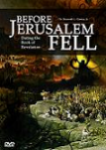
Before Jerusalem Fell Lecture (DVD)
DVD by Ken Gentry
A summary of the evidence for Revelation’s early date. Helpful, succinct introduction to Revelation’s pre-AD 70 composition.
See more study materials at: www.KennethGentry.com
In verse 20 Jesus interprets the vision for us: “As for the mystery of the seven stars which you saw in My right hand, and the seven golden lampstands: the seven stars are the angels of the seven churches, and the seven lampstands are the seven churches” (Rev. 1:20). So then, even though John himself actually saw seven stars and seven lampstands, the stars represent “the angels of the seven churches” and the lampstands represent “the seven churches.” This is what John himself teaches; we cannot dismiss this important clue to symbolic interpretation.
John’s Continuing Practice
What is more, John does not simply provide us one sample of his symbolic method. Several times in Revelation he stops to provide interpretive insights into the visions.
In Revelation 5 John sees a lamb with seven eyes. Even the most naive literalist recognizes this Lamb represents Christ the Lord, for he is called (not literally!) “the Lion that is from the tribe of Judah, the Root of David” (Rev. 5:5). After all, the angels of heaven sing his praise as the Redeemer of God’s people (5:9–10) and as glorious because of his work (5:12). In the next verse he is praised equally with God the Father (5:13). In Revelation 14 the Lamb’s name is associated with God’s name on the elect of God (14:1).
John also provides interpretive directives on one of the more unusual features of the vision of the Lamb. He explains the “seven eyes”: “And I saw between the throne (with the four living creatures) and the elders a Lamb standing, as if slain, having seven horns and seven eyes, which are the seven Spirits of God, sent out into all the earth” (Rev. 5:6). The vision’s seven eyes do not mean that the Lamb literally has seven eyeballs in his head. John tells us so himself.
Despite John’s speaking of “incense” in the angelic bowls in heaven, he re-directs our understanding. He clearly states that the incense which John actually saw really represented the “prayers of the saints”: “And when He had taken the book, the four living creatures and the twenty-four elders fell down before the Lamb, having each one a harp, and golden bowls full of incense, which are the prayers of the saints” (Rev. 5:8).
In Revelation 17:7, 9–10 the interpreting angel clears John’s confusion by noting that one image really represents two altogether different realities: “And the angel said to me, ‘Why do you wonder? I shall tell you the mystery of the woman and of the beast that carries her, which has the seven heads and the ten horns. . . . Here is the mind which has wisdom. The seven heads are seven mountains on which the woman sits, and they are seven kings; five have fallen, one is, the other has not yet come; and when he comes, he must remain a little while” (Rev. 17:9–10). So then, not only do the seven heads not portray seven literal heads on one actual beast, but they symbolize two other realities: seven mountains and seven kings.
And what shall we say of the horns on the beast? They are not horns at all — even though certain mammals do actually possess horns made up of a bony core covered with a sheath of keratinous material. The interpreting angel interprets this for John and for us: “And the ten horns which you saw are ten kings, who have not yet received a kingdom, but they receive authority as kings with the beast for one hour” (Rev. 17:12).
Even the water John sees should not be understood as referring to H2O. Rather, the angel explains: “And he said to me, ‘The waters which you saw where the harlot sits, are peoples and multitudes and nations and tongues’” (Rev. 17:15).
As we can see, John provides us with enough explanatory samples for interpreting Revelation that we should be able categorically to declare that the book should not be interpreted according to the principles of literalism.
Continued in next article.








REVELATION AND LITERALISM
 PMT 2016-030 by Kenneth L. Gentry, Jr.
PMT 2016-030 by Kenneth L. Gentry, Jr.
By all accounts, Revelation is a difficult book. But naive Christians make it even more difficult than it needs be. A serious problem tripping up the modern would-be interpreter is the assumption of literalism when approaching Revelation. Too many contemporary prophecy students resist the symbolic approach to John’s glorious prophecy. “Literalism!” becomes the rally cry for those who believe Revelation lies in our approaching future.
I would point out that despite the popular claim of literalism: no one takes Revelation literally. We take it as God’s truth, to be sure. And it certainly deals with factual historical events. But we cannot take it as God’s truth in literal form. Let us see how this is so.
When interpreting any literary work, we should always listen carefully to the author himself. Especially if he provides information affecting the proper approach to interpreting his work. Certainly Revelation is considered the most difficult New Testament book to interpret. Given the widespread interest in Revelation, this exacerbates the difficulties in presenting John’s message in the modern context. Consequently, hermeneutic methodology becomes a paramount concern for the would-be interpreter. Interestingly, in his Gospel John shows the problem of literalism among Christ’s early hearers: by thinking literalistically they misconstrue Jesus’ teaching regarding the temple (John 2:19–22), being born again (3:3–10), drinking water (4:10–14), eating his flesh (6:51–56), being free (8:31–36), being blind (9:39–40), falling asleep (11:11–14), and his being king (18:33–37). This problem is exacerbated in Revelation with its rich imagery field.
Beast of Revelation: Identified (DVD by Ken Gentry)
A biblical and historical argument for Nero being the beast of Revelation. Professionally recorded and edited with Question and Answers session.
See more study materials at: www.KennethGentry.com
In the very first chapter of Revelation we find the first clues to John’s presentational method. He specifically informs his readers of the symbolic nature of his visions, and provides insights into how the reader should transpose his visions to understand his point.
John’s Opening Announcement
John wastes no time in alerting his readers to his symbolic approach. In the very opening sentence he declares:
“The Revelation of Jesus Christ, which God gave Him to show to His bond-servants, the things which must shortly take place; and He sent and communicated it by His angel to His bond-servant John.” (Rev. 1:1)
Here he informs us that Revelation is given “to show” (Gk.: deixai) the message being “signified” (Gk.: esemanen) by His angel (Rev. 1:1, NKJV). As Friedrich Düsterdieck notes: “The deixai occurs in the way peculiar to semainein, i.e., the indication of what is meant by significative figures.” In fact, forty-one times John says he “sees” these prophecies (e.g., Rev. 1:12, 20; 5:6; 9:1; 20:1).
Premillennial commentator Robert Mounce observes in this regard: “The revelation is said to be signified to John. The Greek verb carries the idea of figurative representation. Strictly speaking it means to make known by some sort of sign (Hort, p. 6). Thus it is admirably suited to the symbolic character of the book. This should warn the reader not to expect a literal presentation of future history, but a symbolic portrayal of that which must yet come to pass.” John encourages his readers to expect figurative symbols rather than literal events.
John’s Opening Vision
In fact, John’s first vision sets the pattern for later symbolic interpretation by presenting a vision then interpreting its key elements in a non-literal way. In Revelation 1:12–20 he records a vision of Christ walking among lampstands. On the literalist assumption the vision should be teaching that the Lord walks among candles in heaven. However, John will not allow that.
Before Jerusalem Fell Lecture (DVD)
DVD by Ken Gentry
A summary of the evidence for Revelation’s early date. Helpful, succinct introduction to Revelation’s pre-AD 70 composition.
See more study materials at: www.KennethGentry.com
In verse 20 Jesus interprets the vision for us: “As for the mystery of the seven stars which you saw in My right hand, and the seven golden lampstands: the seven stars are the angels of the seven churches, and the seven lampstands are the seven churches” (Rev. 1:20). So then, even though John himself actually saw seven stars and seven lampstands, the stars represent “the angels of the seven churches” and the lampstands represent “the seven churches.” This is what John himself teaches; we cannot dismiss this important clue to symbolic interpretation.
John’s Continuing Practice
What is more, John does not simply provide us one sample of his symbolic method. Several times in Revelation he stops to provide interpretive insights into the visions.
In Revelation 5 John sees a lamb with seven eyes. Even the most naive literalist recognizes this Lamb represents Christ the Lord, for he is called (not literally!) “the Lion that is from the tribe of Judah, the Root of David” (Rev. 5:5). After all, the angels of heaven sing his praise as the Redeemer of God’s people (5:9–10) and as glorious because of his work (5:12). In the next verse he is praised equally with God the Father (5:13). In Revelation 14 the Lamb’s name is associated with God’s name on the elect of God (14:1).
John also provides interpretive directives on one of the more unusual features of the vision of the Lamb. He explains the “seven eyes”: “And I saw between the throne (with the four living creatures) and the elders a Lamb standing, as if slain, having seven horns and seven eyes, which are the seven Spirits of God, sent out into all the earth” (Rev. 5:6). The vision’s seven eyes do not mean that the Lamb literally has seven eyeballs in his head. John tells us so himself.
Despite John’s speaking of “incense” in the angelic bowls in heaven, he re-directs our understanding. He clearly states that the incense which John actually saw really represented the “prayers of the saints”: “And when He had taken the book, the four living creatures and the twenty-four elders fell down before the Lamb, having each one a harp, and golden bowls full of incense, which are the prayers of the saints” (Rev. 5:8).
In Revelation 17:7, 9–10 the interpreting angel clears John’s confusion by noting that one image really represents two altogether different realities: “And the angel said to me, ‘Why do you wonder? I shall tell you the mystery of the woman and of the beast that carries her, which has the seven heads and the ten horns. . . . Here is the mind which has wisdom. The seven heads are seven mountains on which the woman sits, and they are seven kings; five have fallen, one is, the other has not yet come; and when he comes, he must remain a little while” (Rev. 17:9–10). So then, not only do the seven heads not portray seven literal heads on one actual beast, but they symbolize two other realities: seven mountains and seven kings.
And what shall we say of the horns on the beast? They are not horns at all — even though certain mammals do actually possess horns made up of a bony core covered with a sheath of keratinous material. The interpreting angel interprets this for John and for us: “And the ten horns which you saw are ten kings, who have not yet received a kingdom, but they receive authority as kings with the beast for one hour” (Rev. 17:12).
Even the water John sees should not be understood as referring to H2O. Rather, the angel explains: “And he said to me, ‘The waters which you saw where the harlot sits, are peoples and multitudes and nations and tongues’” (Rev. 17:15).
As we can see, John provides us with enough explanatory samples for interpreting Revelation that we should be able categorically to declare that the book should not be interpreted according to the principles of literalism.
Continued in next article.








April 29, 2016
GOD’S LAW AND NEW CREATION
 PMT 2016-029 by Kenneth L. Gentry, Jr.
PMT 2016-029 by Kenneth L. Gentry, Jr.
I often receive queries from folks who are thinking through the issue relative to the postmillennial hope. Though not all postmillennialists are theonomic, I am. I believe our hope leads to the expectation that God’s Law will prevail in the world.
Here is a series of emails I received from a reader.
Question 1:
I have a question for you that has bothered me off and on. As a partial preterist, I defend the interpretation of “New heavens and Earth” as the figurative establishment of the New Covenant and the passing away of the old heavens and earth as the passing of the Old Covenant. But as a reluctant theonomist, this puts pressure on my understanding of Matt 5:17 (Jesus saying that the Law will not pass away until the heavens and earth pass away). Because that would seem to indicate then that the binding authority of the Mosaic Law DOES pass away with the Old Covenant if we maintain a consistent interpretation of the “heavens and earth” metaphor as covenants. See what I mean? How do you understand this conundrum?
Answer 1:
The theology of the new heavens / earth parallels that of the resurrection. There is a spiritual dimension that begins in the first century. Then there is the consummate, permanent condition that comes at the end of history. We are spiritually resurrected beginning in the first century; we will be physically resurrected at the end (see John 5:25-29. Likewise there is the spiritual new creation that begins in the first century but that ultimately finds its consummate perfection at the end. Likewise the kingdom came in the first century, and will find consummate perfection at the end.
This theology is the “now / not yet” theology of historic Reformed orthodoxy. In fact, the very notion of a spiritual resurrection, new creation, kingdom virtually demands a consummate, perfected, permanent resurrection, new creation, kingdom.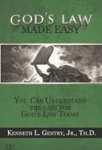
God’s Law Made Easy (by Ken Gentry)
Summary for the case for the continuing relevance of God’s Law.
See more study materials at: www.KennethGentry.com
We see this now / not yet dimension at work in the victory of Christ. Christ has subdued all things: “And He put all things in subjection under His feet, and gave Him as head over all things to the church.” Ephes. 1:22
But in another sense (eschatological, permanent future), this awaits the final subduing of all things as per Heb 2:8: “Thou hast put all things in subjection under his feet. For in subjecting all things to him, He left nothing that is not subject to him. But now we do not yet see all things subjected to him.” Hebrews 2:8.
Question 2:
But as I think about this some more, if the old heavens and earth is the old covenant passed away, and Jesus is linking the binding authority of the Mosaic Law to that passing, then does this not discredit the theonomic thesis that the Mosaic Law is still binding except for NT changes?
Answer 2:
This approach is not possible. Jesus is not speaking of the passing away of the Old Covenant in this context. Rather he is speaking of the coming of the consummate New Heavens and New Earth in its final condition:
(1) It is unreasonable to think he is teaching: “Do not even begin to think that I have come to destroy the Law or prophets, for I will not do so for three years.”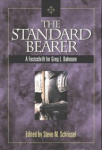
Standard Bearer: Festschrift for Greg Bahnsen (ed. by Steve Schlissel)
Includes two chapters by Gentry on Revelation and theonomy.
See more study materials at: www.KennethGentry.com
(2) It cannot be that he connects the passing of the Law with the closing of the old covenant because he expressly mentions that those in the Kingdom of Heaven must teach and keep it (Matt 5:19), and it his ministry that brings in, initiates, starts, establishes the Kingdom of Heaven as a new spiritual (new covenantal) reality that we now dwell in. Note that:
He associates the Law promotion and Law keeping with the Kingdom of Heaven:
“Whoever then annuls one of the least of these commandments, and so teaches others, shall be called least in the kingdom of heaven; but whoever keeps and teaches them, he shall be called great in the kingdom of heaven. Matthew 5:19
And note that he is bringing in the Kingdom of Heaven:
“For I say to you, that unless your righteousness surpasses that of the scribes and Pharisees, you shall not enter the kingdom of heaven. Matthew 5:20
“Repent, for the kingdom of heaven is at hand.” Matthew 3:2
From that time Jesus began to preach and say, “Repent, for the kingdom of heaven is at hand.” Matthew 4:17.
(3) In Jesus’ explanation of his teaching after declaring Matt 5:17-19, he goes into great detail showing the intensification and deepening of the Law in the Kingdom of Heaven (Matt 5:20ff). None of what he teaches there (which requires the Law as an abiding reality) sounds as if it were only temporary for the next three years. It sounds like a permanent call and condition.
(4) In Matt 5:18 the phrase “passing away of H/E” does not stand alone. It parallels the “accomplishing of all things” (i.e., the end of God-ordained history wherein the plan of God is completed. See Theonomy in Christian Ethics.
(5) Remember that the theonomic argument does not depend on this one passage. See my Covenantal Theonomy, including its citations from Theonomy in Christian Ethics. Other passages demand that the Law of God prevails in the New Covenant era: Rom 3:19, 31; 7:12; 1 Tim 1:8-11. Including the indwelling of the Spirit in the New Covenant age, which indwelling causes us to keep the Law: Rom 8:3-4.
(6) It leads to absurdity: Will Christ dis-establish the Law of God, including its core, the Ten Commandments? Yet the Ten Commandments (and other specific legislation) is repeatedly promoted in the Epistles. All agree that the Ten Commandments is the core of the Law. If the Law is dis-established, surely its core, central identifying element will pass away, too.
(7) Even the New Covenant itself (Jer 31:31-34) portrays the New Covenant condition as involving the Law of God. The difference in the Old Covenant and New Covenant (in Jer 31 and elsewhere) involves its putting the Law in the heart, at the controlling core of our being, so that it is not merely imprinted on stones.








April 26, 2016
POSTMILLENNIALISM AND CHURCH
 PMT 2016-028 by Kenneth L. Gentry, Jr.
PMT 2016-028 by Kenneth L. Gentry, Jr.
Postmillennialism holds a high view of the church. And of Christian worship in the church. And membership in the church. The church is the central focus of the kingdom of God. Much of the decline of Christianity that we are witnessing in America is related to Christians failing to understand the significance of the church for the Christian life.
In this article I will briefly present a biblical argument for church membership. Revival and reformation in our land must begin the church, the household of God.
I see so many Christians in America who have disassociated themselves from particular church membership. They do not see any reason for or value in joining a local congregation. So what is the biblical argument for formal church membership? Though there are many arguments, here are four that should encourage us in seeking church membership.
First, Scripture teaches that believers are to associate themselves together in worship. In Hebrews the writer is discouraging Jews who have professed faith in Christ not to leave the church and return to the synagogue: “not forsaking our own assembling together, as is the habit of some, but encouraging one another” (Heb 10:25). In fact, in the earliest appearance of Christianity we see the disciples doing just that: “They were continually devoting themselves to the apostles’ teaching and to fellowship, to the breaking of bread and to prayer” (Acts 2:42).
Ecclesiology Course
25 Gentry downloadable class lectures
Full Christ College course lectures on the doctrine of the Church.
Includes sizeable study of the sacraments.
See more study materials at: www.KennethGentry.com
This is why the Lord’s day became so important in the early Christianity. It was the time for the formal, public gathering of Christians to worship. In Acts 20:7 we read: “On the first day of the week, when we were gathered together to break bread, Paul began talking to them.” Had they not gathered together, they would not have heard Paul’s message and would not have been instructed in the things of God properly.
In 1 Corinthians 16:1-2 we read Paul’s directive regarding taking up offerings. His question assumes churches do gather together in their various localities, and that they gather on the first day of the week: “Now concerning the collection for the saints, as I directed the churches of Galatia, so do you also. On the first day of every week each one of you is to put aside and save, as he may prosper, so that no collections be made when I come.”
This, of course, does not mandate formal, vow-taking church membership, but it is a foundational point upon which we can build a case for church membership. Too many Christians are lone gunners for Jesus, sleeping in on Sundays, and declaring they can worship God just as well at home with their own families. Usually all it takes to explode this assertion is to ask a simple question: “But do you”? And if you meet the rare person who does actually worship with his family alone, ask them: “Do you take the Lord’s supper which Jesus commanded us to do until he returns (1 Cor 11:26)?”
Second, the NT establishes elders and deacons as officers in the church. In Acts 14:23 we read: “When they had appointed elders for them in every church, having prayed with fasting, they commended them to the Lord in whom they had believed.” In Acts 20:17 we read of Paul: “From Miletus he sent to Ephesus and called to him the elders of the church. In Acts 6:1-6 we see the first deacons established in church office by election. In 1 Timothy 3 and Titus 1 Paul gives the pre-requisites for church office, for both elders and deacons.
But now the question arises: How are we to elect church officers if there is no formal church membership? Can just anyone vote for church officers? Could Muslims come into our gathering and vote to elect officers to govern Christ’s church? Certainly not. The very concept of elected church office requires formal church membership, just as nations require citizenship to vote for rulers.
“Godly Worship“
7 downloadable messages by Ken Gentry
The Church of our Lord is to be a worshiping community. But today we are so experience-oriented and entertainment-driven that worship has been washed out. In this study we emphasize the significance of proper worship according to biblical principle. At the same time the study seeks to counter-balance those who would claim that we may only sing psalms in our worship service.
See more study materials at: www.KennethGentry.com
Third, church officers are to exercise a real governmental oversight in the gathered body of Christ. In Hebrews 13:17 we read: “Obey your leaders and submit to them, for they keep watch over your souls as those who will give an account. Let them do this with joy and not with grief, for this would be unprofitable for you. But how can this be if there is no one formally under that oversight — as in formal church membership?
Fourth, the NT speaks of church discipline whereby some Christians are put outside the church. In Matthew 18:15–18 excommunication is established in which a person is put out of the church. But if they are not members of the church, how can they be put out? If the church body has no formal oversight of them, how can they put them outside the church? Paul speaks of the necessity of church discipline so that one “would be removed from you midst” (1 Cor 5:2).
This important factor of church government requires some form of formal oversight, and therefore membership. I cannot simply self-excommunicate someone from the Christian faith. This requires an organized and authorized body of officers who are elected to office. And this requires church membership.
Thus, in the final analysis, formal church membership is implicit in how the church operates, according to the NT.
Click on the following images for more information on these studies:











April 22, 2016
GOD’S SOVEREIGNTY; MAN’S QUESTIONS (3)
 PMT 2016-027 by Kenneth L. Gentry, Jr.
PMT 2016-027 by Kenneth L. Gentry, Jr.
We have been considering the absolute sovereignty of God in this series on postmillennialism. If one holds to a strong (biblical!) view of God’s sovereignty, then postmillennialism cannot be dismissed out-of-hand by claims that it is to difficult. The only credible argument against postmillennialism can be a biblical argument. But many of the arguments are more emotional than biblical.
In this part of the series I have been considering moral objections to God’s absolute sovereignty. I have been showing that there are other doctrines that Christians hold that are equally objectionable on moral grounds, but which most Christians hold. In this installment I will focus on the doctrine of eternal hell.
Objections against hell
When we come to the doctrine of eternal hell we are entering into a discussion of the most “morally repugnant” and “emotionally repulsive” doctrine within the whole system of Christian theology. Who can seriously contemplate the doctrine of hell without some sort of fear and trepidation? Though historically the Church has affirmed the doctrine of eternal hell, voices within the Christian tradition have long tried to re-interpret this doctrine to make it more palatable. Some have reduced the doctrine of hell to a doctrine of heck. And, of course, opponents of the Christian faith often point to the doctrine as obvious evidence that Christianity could not be true.
Four Views on the Book of Revelation
(ed. by Marvin Pate)
Helpful presentation of four approaches to Revelation. Ken Gentry writes the chapter on the preterist approach to Revelation, which provides a 50 page survey of Revelation .
See more study materials at: www.KennethGentry.com
Influential writers expressing revulsion at the doctrine of hell include the following:
John R. W. Stott has commented (as a conservative, evangelical Christian): “Emotionally, I find the concept intolerable.”
Clark H. Pinnock (who deems himself evangelical) writes: “Whatever the image, the traditional understanding of hell is unspeakably horrible. How can one imagine for a moment that the God who gave his Son to die for sinners because of his great love for them would install a torture chamber somewhere in the new creation in order to subject those who reject him to everlasting pain?”
Christian statement on hell
Nevertheless, Christians have largely agreed that the Bible teaches about hell. The following Confessional statement on hell represents the thinking of perhaps the majority of evangelical Christians. WCF 32:1: “The souls of the wicked are cast into hell, where they remain in torments and utter darkness, reserved to the judgment of the great day.”
Biblical declaration of hell
The Bible undeniably presents eternal hell as the ultimate judgment of the wicked. In fact, more is taught about hell by Christ himself than any other single individual in Scripture. Thus, our view of hell also impacts our view of Christ and his integrity and authority, as the atheist Bertrand Russell observed. Consider the forthright declarations of Scripture — several from our Lord Jesus himself.
You have heard that it was said, ‘You shall not commit adultery’; but I say to you, that everyone who looks on a woman to lust for her has committed adultery with her already in his heart. And if your right eye makes you stumble, tear it out, and throw it from you; for it is better for you that one of the parts of your body perish, than for your whole body to be thrown into hell. And if your right hand makes you stumble, cut it off, and throw it from you; for it is better for you that one of the parts of your body perish, than for your whole body to go into hell. (Matt 5:27–30)
So it will be at the end of the age; the angels shall come forth, and take out the wicked from among the righteous, and will cast them into the furnace of fire; there shall be weeping and gnashing of teeth. (Matt 13:49–50)
Great Tribulation: Past or Future?
(Thomas Ice v. Ken Gentry)
Debate book on the nature and timing of the great tribulation. Both sides thoroughly cover the evidence they deem necessary, then interact with each other.
See more study materials at: www.KennethGentry.com
Then He will also say to those on His left, ‘Depart from Me, accursed ones, into the eternal fire which has been prepared for the devil and his angels. . . .’ And these will go away into eternal punishment, but the righteous into eternal life. (Matt 25:41, 46)
And whoever causes one of these little ones who believe to stumble, it would be better for him if, with a heavy millstone hung around his neck, he had been cast into the sea. And if your hand causes you to stumble, cut it off; it is better for you to enter life crippled, than having your two hands, to go into hell, into the unquenchable fire, where their worm does not die, and the fire is not quenched. And if your foot causes you to stumble, cut it off; it is better for you to enter life lame, than having your two feet, to be cast into hell, where their worm does not die, and the fire is not quenched. And if your eye causes you to stumble, cast it out; it is better for you to enter the kingdom of God with one eye, than having two eyes, to be cast into hell, where their worm does not die, and the fire is not quenched.’ (Mark 9:42–48)
Just as Sodom and Gomorrah and the cities around them, since they in the same way as these indulged in gross immorality and went after strange flesh, are exhibited as an example, in undergoing the punishment of eternal fire. (Jude 7)
And another angel, a third one, followed them, saying with a loud voice, ‘If anyone worships the beast and his image, and receives a mark on his forehead or upon his hand, he also will drink of the wine of the wrath of God, which is mixed in full strength in the cup of His anger; and he will be tormented with fire and brimstone in the presence of the holy angels and in the presence of the Lamb. And the smoke of their torment goes up forever and ever; and they have no rest day and night, those who worship the beast and his image, and whoever receives the mark of his name.’ (Rev 14:9–11)
According to a recent Gallup Poll, 65% of the American population believes in hell, whereas 92% of those who attend church regularly believe in hell (hopefully not because their church service is so bad). The average evangelical Christian accepts the doctrine of hell, despite its intellectual and moral challenges. Yet many of the same Christians reject predestination on identical intellectual and moral grounds. This brings inconsistency into one’s reasoning. We must accept what the Scripture teaches no matter how difficult it may seem to our finite, fallen conceptions.
Click on the following images for more information on these studies:

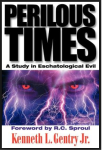









April 19, 2016
GOD’S SOVEREIGNTY; MAN’S QUESTIONS (2)
 PMT 2016-026 by Kenneth L. Gentry, Jr.
PMT 2016-026 by Kenneth L. Gentry, Jr.
In this series I am arguing for the absolute sovereignty of God as a foundation stone for the postmillennial hope. If we believe God is absolutely sovereign we should not discount postmillennialism on the basis of it seeming so difficult.
In my last article I began considering the leading objections to the doctrine of God’s absolute sovereignty. Many evangelical Christians reject predestination and God’s absolute sovereignty because they are so intellectually difficult to grasp. But I pointed out that Christianity has other equally difficult doctrines, such as the Trinity and the hypostatic union of Christ. Yet, they will gladly affirm these doctrines.
In this article I consider the moral difficulty in accepting absolute predestination. I will quickly introduce two doctrines that are deemed immoral by those outside of Christ, yet are strongly held by Bible-believing Christians: (1) The imputation of sin; (2) the exclusiveness of Christianity. If we can hold to these doctrines despite moral objections, why can we not affirm predestination? In my next article I will introduce the leading moral objection to Christianity.
The imputation of sin
Theologian Wayne Grudem explains the biblical perspective on Adam’s fall and our condemnation: “All members of the human race were represented by Adam in the time of testing in the Garden of Eden. As our representative, Adam sinned, and God counted us guilty as well as Adam. . . . God counted Adam’s guilt as belonging to us. . . . God rightly imputed Adam’s guilt to us.”
The Christ of the Prophets (by O. Palmer Robertson)
Roberston examines the origins of prophetism, the prophets’ call, and their proclamation and application of law and covenant.
Grudem comments on the moral revulsion to this doctrine: “When we first confront the idea that we have been counted guilty because of Adam’s sin, our tendency is to protest because it seems unfair. We did not actually decide to sin, did we? Then how can we be counted guilty? Is it just for God to act this way?”
Yet this understanding comes directly from Scripture:
“Until the Law sin was in the world; but sin is not imputed when there is no law. Nevertheless death reigned from Adam until Moses, even over those who had not sinned in the likeness of the offense of Adam, who is a type of Him who was to come. . . . So then as through one transgression there resulted condemnation to all men, even so through one act of righteousness there resulted justification of life to all men. For as through the one man’s disobedience the many were made sinners, even so through the obedience of the One the many will be made righteous.” (Rom 5:13–14, 18–19)
If we deny the moral legitimacy of imputation, we are denying the direct biblical teaching on the subject. To make matters worse, this method ends up destroying our own salvation. For if it is morally inappropriate for one to act in the place of another as his representative, then it is wrong for Christ to act in our place to secure our salvation through his merit! Once again, the methodology employed to dispute predestination comes back to haunt us.
The exclusiveness of Christianity
The doctrine of Christian exclusivism declares that salvation only comes through Christ and his covenant and by means of a personal faith in him. In order to be saved men must exercise faith in his name. It further teaches that no one can be saved without personally professing faith in Christ’s name, no matter how “religious” they are in their devotion, how “good” they may be in their conduct, how “innocent” they may appear to others, or how “disadvantaged” is their cultural context.
Regarding this matter, three views of salvation have arisen among theologians:
Pluralism: “A pluralist is a person who thinks humans may be saved through a number of different religious traditions and saviors.” On this view, all the great world religions are acceptable to God in that they arise out of man’s sincere striving to find and please God. Hence, the view is “pluralistic” in that it accepts a plurality of religions.
Inclusivism: “Inclusivists believe that salvation is impossible apart from Jesus and that he is the only Savior. But this does not mean that people have to know about Jesus or actually believe in him to receive that salvation.” On this view, Jesus is the only Savior, but his salvation includes (therefore, is “inclusive”) those who do not personally know him in faith.
Exclusivism: “Christian exclusivism can be defined as the belief that (1) Jesus Christ is the only Savior, and (2) explicit faith in Jesus Christ is necessary for salvation.” This is the orthodox view that is held by the vast majority of evangelical Christians.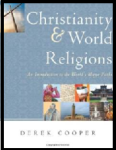
Christianity and the World Religions:
By Derek CooperCooper. Examines the rival worldviews found in Hinduism, Buddhism, Confucianism and Taoism, Judaism, Islam, and irreligion. He engages these worldviews from a Christian perspective.
See more study materials: www.KennethGentry.com
The reasons the first two views exist at all is due to the methodological bugaboo we have been considering: emotional reflex and moral revulsion. This time the reflex is against the notion that decent people, through no fault of their own, living in non-Christian lands would be condemned by a loving, merciful God.
The inclusivist further notes that this is problematic in that God’s Son died for the sins of the world. For instance, as evangelical theologian Ron Nash notes of John Hick: “Hick’s encounters with devout and moral non-Christians led him to think it was no longer possible to ‘argue that Christianity or Christ is the sole means of salvation since it is evident that many outside Christianity, and outside the influence of the historical Jesus, are in fact saved.’”
Yet the Bible expressly and dogmatically teaches this view of salvation known as “exclusivism.” This has been the historic position of the orthodox Christian church. In fact, this view underscores the necessity of the Christian faith and the significance of the Christian evangelistic and missionary outreach. Consider the following passages:
“Jesus said to him, ‘I am the way, and the truth, and the life; no one comes to the Father, but through Me.’” (John 14:6)
“If you confess with your mouth Jesus as Lord, and believe in your heart that God raised Him from the dead, you shall be saved; for with the heart man believes, resulting in righteousness, and with the mouth he confesses, resulting in salvation . . . for ‘Whoever will call upon the name of the Lord will be saved.’ How then shall they call upon Him in whom they have not believed? And how shall they believe in Him whom they have not heard? And how shall they hear without a preacher? And how shall they preach unless they are sent? Just as it is written, ‘How beautiful are the feet of those who bring glad tidings of good things!’” (Rom 10:9–10, 13–15)
So then, despite the “moral difficulty” of this historic Christian exclusivistic understanding of eternal salvation, the average Christian recognizes its necessity. Remarkably, many who oppose predestination on moral grounds will nevertheless affirm exclusivism, despite the same moral difficulty.
Click on the following images for more information on these studies:


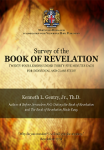








April 15, 2016
GOD’S SOVEREIGNTY; MAN’S QUESTIONS (1)
 PMT 2016-025 by Kenneth L. Gentry, Jr.
PMT 2016-025 by Kenneth L. Gentry, Jr.
In my current series I have been focusing on God’s absolute sovereignty as an important foundation to the postmillennial hope. If we firmly believe God is sovereign over all things, it should not be difficult for us to believe those Scriptures that teach the universal conquest of the gospel. Not all postmillennialists are Calvinists. But they should be!
But now we need to consider objections to God’s sovereignty in predestination. As this series continues, I will present the two leading objections to God’s sovereignty:
1. Is it logical? How can we comprehend two seemingly contradictory doctrines: predestination and free will? If God predetermines our actions, how can we be free? This turns off many Christians who recognize that man has free will.
2. Is it moral? How can we accept the implications of God’s absolute sovereignty? How could a perfect, just God irrevocably predetermine the eternal destinies of men created in his image? This turns off many Christians who deem God’s sovereignty to be immoral.
In this article I will focus on the first question. So let us begin. Though there are many ways we could approach this question, I have chosen to approach it with the evangelical Christian in mind. What do I mean? We need to recognize that the “logical problem” in sovereignty is not limited to this one issue. We must recognize that a number of commonly accepted theological teachings of Scripture run into this “problem.”
The Beast of Revelation
by Ken Gentry
A popularly written antidote to dispensational sensationalism and newspaper exegesis. Convincing biblical and historical evidence showing that the Beast was the Roman Emperor Nero Caesar, the first civil persecutor of the Church. The second half of the book shows Revelation’s date of writing, proving its composition as prior to the Fall of Jerusalem in A.D. 70. A thought-provoking treatment of a fascinating and confusing topic.
For more study materials, go to: KennethGentry.com
The doctrine of God
Have you ever logically reflected on the doctrine of the Trinity? Wayne Grudem defines the Trinity in this way: “God eternally exists as three persons, Father, Son, and Holy Spirit and each person is fully God, and there is one God.” What evangelical Christian doubts this definition? It is foundational to the Christian faith.
The Trinity is a doctrine unique among all world religions. It is a doctrine that virtually defines true Christianity. Yet it is a doctrine fraught with intellectual challenges — in that we hold there is only one God, while simultaneously holding that the Father, the Son, and the Holy Spirit are each God. As a result of this doctrine, evangelical theologians confess a problem:
Thomas C. Oden declares: “The idea that the one God meets us in three persons is thought to be among the most opaque and least accessible of all Christian teachings.”
Millard Erickson states: “Christianity is the only major religion that makes this claim about God.
Numerous attempts have been made to understand this profound truth. Some have led to distortions of this very important doctrine.” He continues: “In the doctrine of the Trinity, we encounter one of the truly distinctive doctrines of Christianity. Among the religions of the world, the Christian faith is unique in making the claim that God is one and yet there are three who are God. Although it seems on the surface to be a self-contradictory doctrine . . . nevertheless, devout minds have been led to it as they sought to do justice to the witness of Scripture.”
Thus, the most fundamental doctrine of the Christian faith involves intellectually incomprehensible features. Yet evangelical, orthodox Christians still affirm the doctrine of the Trinity. To accept a method (a refusal to accept intellectual incomprehensibility) that leads us to reject difficult doctrines (such as predestination) opens the prospect of either rejecting other fundamental doctrines or exposing us to enduring charges of inconsistency in accepting some difficult doctrines while rejecting others.
Blame It on the Brain?
Sub-title: Distinguishing Chemical Imbalances, Brain Disorders, and Disobedience
by Edward T. Welch
Depression, Attention Deficit Disorder, Alcoholism, Homosexuality.
Research suggests that more and more behaviors are caused by brain function or dysfunction.
But is it ever legitimate to blame misbehavior on the brain?
How can I know whether my brain made me do it?
See more study materials at: www.KennethGentry.com
The doctrine of Christ
A second doctrine that is equally important to the Christian is: the two natures of Christ. Theologian Wayne Grudem defines the biblical doctrine of Christ’s person: “Jesus Christ was fully God and fully man in one person, and will be so forever.”
The doctrine of the two-natured Christ has long been assaulted as intellectually unintelligible. According to Wayne Grudem, John Hick argues in The Myth of God Incarnate (1977) that this doctrine “has never been a coherent or intelligible doctrine through the history of the church.” Grudem responds:
“The assertion that ‘Jesus was fully God and fully man in one person,’ though not a contradiction, is a paradox that we cannot fully understand in this age and perhaps not for all eternity, but this does not give us the right to label it ‘incoherent’ or ‘unintelligible’. . . . Our proper response [to unbelieving challenges] is not to reject the clear and central teaching of Scripture about the incarnation, but simply to recognize that it will remain a paradox, that this is all that God has chosen to reveal to us about it, and that it is true.”
Millard Erickson expresses the objections to the two-natured Christ: “The problems of Christology were posed largely in terms of metaphysics: How can the divine nature and the human nature coexist within one person? Or, to put it differently, how can Jesus be both God and man at once?” He notes that philosophers argue against understanding Christ as possessing two natures: “It is neither necessary nor possible to do so.” He then confesses as an orthodox Christian: “To be sure, there is a paradox here, a concept that is very difficult to assimilate intellectually.”
Even though we cannot fully comprehend how Christ is 100% God and 100% man simultaneously, without intermixture or dilution of the natures, we believe it — because Scripture teaches it.
Intellectual difficulty is not necessarily a sign of doctrinal error, but rather of human incapacity. By it we are reminded of the distance between the infinite, eternal, perfect God and finite, temporal, fallen man. We are reminded of the reality of mystery in God’s being.









April 12, 2016
GOD’S SOVEREIGNTY; OUR HOPE (3)
 PMT 2016-024 by Kenneth L. Gentry, Jr.
PMT 2016-024 by Kenneth L. Gentry, Jr.
This is the last in a three-part series that is basically citing verses demonstrating God’s sovereignty over the affairs of the world. It is important that postmillennialists always bear in mind that, no matter what the current external circumstances may suggest, God is in control He sovereignly ordains whatsoever comes to pass. He graciously and sovereignly saves sinners; and he will continue to do so until this world is overwhelmed by the presence of his grace-filled people.
In this series I am basically citing one Scripture after another in demonstration of God’s marvelous sovereignty. God’s word is more compelling than mine in expressing the postmillennial hope. And his word’s statements on his sovereign and gracious power should encourage us to recognize that he has a plan that he intends to fulfill by his almighty power.
God’s Predestinating Counsel
Thine eyes have seen my unformed substance; / And in Thy book they were all written, / The days that were ordained for me, / When as yet there was not one of them. (Psa 139:16)
Remember the former things long past, / For I am God, and there is no other; / I am God, and there is no one like Me, / Declaring the end from the beginning / And from ancient times things which have not been done, / Saying, “My purpose will be established, / And I will accomplish all My good pleasure.” (Isa 46:9–10)
The Climax of the Book of Revelation (Rev 19-22)
Six lectures on six DVDs that introduce Revelation as a whole, then focuses on its glorious conclusion. Provides an important, lengthy Introduction to Revelation also.
See more study materials at: www.KennethGentry.com
For to do whatsoever thy hand and thy counsel determined before to be done. (Acts 4:28)
And when the Gentiles heard this, they were glad, and glorified the word of the Lord: and as many as were ordained to eternal life believed. (Acts 13:48)
We speak God’s wisdom in a mystery, the hidden wisdom, which God predestined before the ages to our glory. (1 Cor 2:7)
Blessed be the God and Father of our Lord Jesus Christ, who has blessed us with every spiritual blessing in the heavenly places in Christ, just as He chose us in Him before the foundation of the world, that we should be holy and without blame before Him in love, having predestined us to adoption as sons by Jesus Christ to Himself, according to the good pleasure of His will, to the praise of the glory of His grace, by which He made us accepted in the Beloved. (Eph 1:3–5)
In Him also we have obtained an inheritance, being predestined according to the purpose of Him who works all things according to the counsel of His will. (Eph 1:12)
According to the eternal purpose which he purposed in Christ Jesus our Lord. (Eph 3:11)
For whom he did foreknow, he also did predestinate to be conformed to the image of his Son, that he might be the firstborn among many brethren. Moreover whom he did predestinate, them he also called: and whom he called, them he also justified: and whom he justified, them he also glorified. (Rom 8:29–30)
He has saved us, and called us with a holy calling, not according to our works, but according to His own purpose and grace which was granted us in Christ Jesus from all eternity. (2 Tim 1:9)
For there are certain men crept in unawares, who were before of old ordained to this condemnation, ungodly men, turning the grace of our God into lasciviousness, and deny–ing the only Lord God, and our Lord Jesus Christ. (Jude 4)
God’s Choosing for Salvation
Then the King will say to those on His right, ‘Come, you who are blessed of My Father, inherit the kingdom prepared for you from the foundation of the world.’ (Matt 25:34)
Who shall lay any thing to the charge of God’s elect? It is God that justifieth. (Rom 8:33)
For the children being not yet born, neither having done any good or evil, that the purpose of God according to election might stand, not of works, but of him that calleth. (Rom 9:11)
Even so then at this present time also there is a remnant according to the election of grace. . . . What then? Israel hath not obtained that which he seeketh for; but the election hath obtained it, and the rest were blinded (according as it is written, God hath given them the spirit of slumber, eyes that they should not see, and ears that they should not hear) unto this day. (Rom 11:5, 7–8)
Knowing, brethren beloved, your election of God. (1 Thess 1:4)
But we should always give thanks to God for you, brethren beloved by the Lord, because God has chosen you from the beginning for salvation through sanctification by the Spirit and faith in the truth. (2 Thess 2:13)
I charge thee before God, and the Lord Jesus Christ, and the elect angels, that thou observe these things without preferring one before another, doing nothing by partiality. (1 Tim 5:2)
Paul, a servant of God, and an apostle of Jesus Christ, according to the faith of God’s elect, and the acknowledging of the truth which is after godliness; in hope of eternal life, which God, that cannot lie, promised before the world began. (Tit 1:1–2)
Elect according to the foreknowledge of God the Father, through sanctification of the Spirit, unto obedience and sprinkling of the blood of Jesus Christ: Grace unto you, and peace, be multiplied. (1 Pet 1:20)
The church that is at Babylon, elected together with you, saluteth you; and so doth Marcus my son. (1 Pet 5:13)
Wherefore the rather, brethren, give diligence to make your calling and election sure: for if ye do these things, ye shall never fall. (2 Pet 1:10)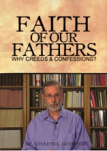
Faith of Our Fathers (DVDs by Ken Gentry)
Explains the point of creeds for those not familiar with their rationale.
Also defends their biblical warrant and practical usefulness.
See more study materials at: www.KennethGentry.com
Conclusion
Though I did not expound the teaching of these verses, we can at least see that the notion of God’s absolute sovereignty is abundantly displayed in Scripture. A theme appearing that frequently and in such a wide range of passages employing such an array of terms shows that it is not some side issue in the Bible. Perhaps opponents of predestination may spin a few verses as a means of countering the doctrine, but they will become quite dizzy if they attempt to spin such a great mass of evidence.
Have hope, postmillennialists! Our God reigns!
Click on the following images for more information on these studies:











Kenneth L. Gentry Jr.'s Blog
- Kenneth L. Gentry Jr.'s profile
- 85 followers



